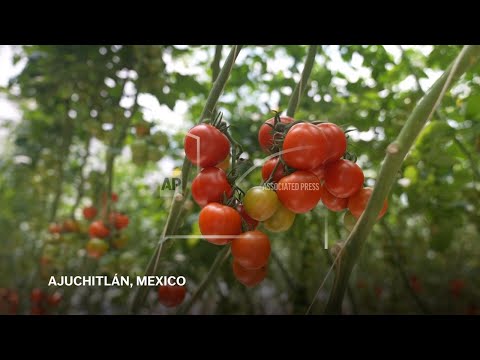(25 Jul 2025)
RESTRICTION SUMMARY:
ASSOCIATED PRESS
Ajuchitlán, Mexico – 23 July 2025
1. Various of tomato plants in greenhouse
2. SOUNDBITE (Spanish) Moisés Atri, tomato grower: ++ STARTS ON SHOT 1++
"We’re paying it (tariff on U.S. tomato imports). We’re already paying the 17.09%. None of us (producers) can afford it (duty on U.S. tomato imports). We have to approach our client to adjust the prices because we’re nowhere near making that kind of profit (17%)."
3. Workers looking after tomato plants
4. Worker trimming plants
5. SOUNDBITE (Spanish) Marisol Reséndiz, worker at tomato greenhouse: ++STARTS ON SHOT 3++
"We don’t worry much about it. Unless, when it’s time for the mandatory profit sharing, they tell us there is no profit. And that would be because there was no production."
6. Worker at greenhouse, Roberto Gil, traveling through greenhouse on lift
7. Close of lift controls
8. SOUNDBITE (Spanish) Roberto Gil, worker at tomato greenhouse: ++STARTS ON SHOT 6++
"The most worrying thing is that the company, or tomato exports, could be shut down. And, as a result, we could lose our jobs."
9. Tomatoes packed for export
10. Tomatoes in boxes
11. Mid of packed tomatoes
STORYLINE:
The owner of a greenhouse growing tomatoes in central Mexico expressed concern on Wednesday about a tariff imposed by the Trump administration on the Mexican produce.
The 17% duty on most fresh Mexican tomatoes, announced last week, is already being applied to exports, raising alarm in the sprawling greenhouses of central Mexico where tomatoes are grown in carefully controlled environments for the U.S. market.
Moisés Atri, one of the owners of Veggie Prime, said the firm had initially paid the tariff but hoped U.S. importers will begin covering the costs and passing it onto their consumers.
He said his business, which provides jobs to thousands, cannot afford the duty.
Veggie Prime supplies tomatoes through a U.S. distributor to major retailers, including grocery chain Trader Joe’s.
Marisol Reséndiz, 47, who works at Atri’s greenhouse, said she’s not worried yet — but she will be if the tariff ends up affecting her income.
Roberto Gil, 32, another worker at the company, said he fears losing his job.
Mexico currently supplies about 70% of the U.S. tomato market, according to the Florida Tomato Exchange
President Claudia Sheinbaum warned last week that the United States is in no position to replace Mexican tomato imports with domestic or foreign alternatives, saying U.S. demand is too high to be met by other producers — even with the added cost.
She said her government is working to have the duty removed but is also exploring support options for affected growers, including boosting domestic consumption and opening new export markets.
The duty was announced after negotiations failed to produce a deal to avert the tariff.
Supporters say the import tax will help revive the shrinking U.S. tomato industry and reduce reliance on foreign produce.
Critics warn it will lead to higher prices for American consumers.
AP video shot by Martín Silva Rey
===========================================================
Clients are reminded to adhere to all listed restrictions and to check the terms of their licence agreements. For further assistance, please contact the AP Archive on: Tel +44(0)2074827482 Email: info@aparchive.com.
Find out more about AP Archive: http://www.aparchive.com/HowWeWork
Twitter: https://twitter.com/AP_Archive
Facebook: https://www.facebook.com/APArchives
Instagram: https://www.instagram.com/APNews/
You can license this story through AP Archive: http://www.aparchive.com/metadata/youtube/a659f8a44ee64236816d4d9013ad465f
Author: AP Archive
Go to Source
News post in July 30, 2025, 3:05 am.
Visit Our Sponsor’s:
News Post In – News





